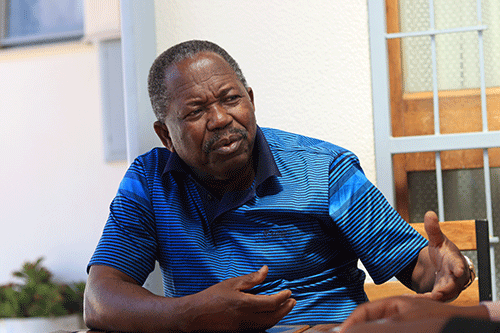Defence minister Frans Kapofi has dismissed claims that the ruling party ‘over-compromised’ when it reached a settlement agreement that delivered Namibia’s political independence, which left strategic resources in the hands of former oppressors.
It is generally held by certain quarters that many Namibians do not have access to means of production – such as land – while the economy is controlled by the minority.
This was the case before independence, it is argued.
It is embedded in the supreme law of the land, Article 16, which guarantees the right to property.
Critics of the property right clause say its presence has meant the government cannot repossess that which was “stolen” through colonialism.
During an exclusive sit-down with this newspaper at his Windhoek residence recently, Kapofi dismissed claims that “Swapo sold out” the revolution.
Put to him point blank if Swapo leaders made more concessions than necessary, he retorted: “We were fighters. I was not part of the negotiations. But what compromise have we made? Negotiations are about to give and take. Compromising is also allowed – as long as it is not treacherous”.
He pointed to the example of the harbour town of Walvis Bay, which became part of Namibia five years after independence.
“We were not willing to come home without Walvis Bay,” he said.
Through a concession, however, South Africa was allowed to continue occupying the coastal town.
“We were advised that ‘maybe it’s better to fight for Walvis Bay, with all your resources and better to have the enclave, which you can get while you are in Namibia’. We heeded that. We saw sense.”
For the former military commissar, war was not fashionable.
“We also didn’t want our people to continue suffering because we did not see any benefit. Fighting was not a jolly thing. It’s a serious thing where people lost lives.
“Even if people say the independence was not brought through the barrel of the gun, my friend, the gun has spoken louder than politics,” Kapofi advanced Swapo, he said, fought on both military and diplomatic fronts. “The fight, which Swapo undertook since 1966, was a political war. It was to make our voices louder and to be heard far and near by everybody. It was necessarily not aimed at conquering. Ours was to put pressure on the South African regime and whoever to understand there are people who are fighting for their country… the armed struggle was to amplify the message Swapo is giving,” Kapofi said.
Affectionately known as ‘Amin’ in the military trenches, Kapofi defended the settlement, saying it was never Swapo’s intention to fight forever.
“We have lost many people in that war. But we were always willing to negotiate. That is why we never abandoned our diplomatic actions. Our diplomatic and political pressure remained, despite the armed struggle, and we were determined to go on for as long as it was going to take to free ourselves.”
The year 1978 was a turning point when the United Nations (UN) Security Council took Resolution 435, which called for the withdrawal of South African forces from Namibia and the transfer of power to the people of Namibia. It also established the United Nations Transition Assistance Group (UNTAG) that would later deliver Namibia’s independence through UN supervision and control.
To Swapo’s shock and dismay, South African forces made bombs rain on Cassinga, a Swapo refugee camp in southern Angola, killing at least 600 Namibians, mainly women and children, and leaving dozens of others injured.
“We realised that their aim was simply to demoralise us and were not serious,” he said.
Revolution Earlier this year, when President Hage Geingob met Independent Patriots for Change leader Panduleni Itula, he conceded that Namibians do not genuinely own their resources.
It is Geingob’s view that without a revolution to nationalise all land, mines and other strategic institutions, ownership of the country’s resources, as contemplated in Article 100 of the Namibian Constitution, is a mere hallucination.
“As revolutionaries, maybe the best thing is to go back to the revolution of communists so that we can nationalise the resources. Then we own them constitutionally. Right now, we have a mixed economy…,” Geingob said.
The president was quick to concede that nationalising key resources to give complete ownership to the State will be met with resistance.
Geingob was responding to Itula’s question about the ownership of the oil discovery at the Graff-1 deep-water exploration well, located in the Orange Basin some 270 kilometres away from the diamond mining town of Oranjemund.
Geingob courted controversy since
his comments during an interview with Qatar-based media network, Al Jazeera, in which he said the oil does not legally belong to Namibians.
Itula, like many Namibians, was unimpressed by the statement.
“The provisions in Article 100, in its interpretation, in my view, is a positive obligation [that] the utilisation of our resources that belongs and shall belong to the State, meaning the sovereigns, for the beneficiation and provision of social services, hospitals and all the infrastructure that is required,” Itula said at the time.
– Additional reporting by Nampa
– emumbuu@nepc.com.na


